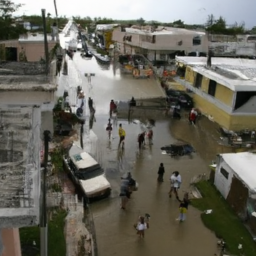As Tropical Storm Imelda continues to wreak havoc across the Caribbean, the region is grappling with severe weather conditions that have prompted emergency responses and tragic loss of life. In my experience covering tropical storms, the impact of such weather systems can be devastating, and the current situation underscores the need for preparedness and swift action. The Bahamas has been particularly affected, with officials issuing evacuation orders for several vulnerable areas. These measures aim to protect residents from the storms anticipated heavy rainfall and strong winds. The government has mobilized resources to assist those displaced, providing shelters and essential supplies. Observations indicate that the storms trajectory could lead to significant flooding, raising concerns about infrastructure and public safety. In Cuba, the situation is equally dire. Reports confirm that at least two fatalities have occurred as a direct result of the storms impact. The Cuban government has activated its disaster response protocols, focusing on rescue operations and ensuring the safety of its citizens. Experts agree that the combination of high winds and torrential rain poses a serious threat to both life and property. The loss of life is a tragic reminder of the dangers posed by tropical storms, and it is essential to analyze the factors contributing to these events. Tropical Storm Imelda is not alone in its impact on the Caribbean; it is accompanied by another system, Tropical Storm Humberto. Both storms have been classified as significant weather events, with Humberto also expected to bring adverse conditions to the region. According to official reports from meteorological agencies, the convergence of these storms has created a complex weather pattern, complicating forecasting and response efforts. Research shows that the frequency and intensity of tropical storms have increased in recent years, a trend that experts attribute to climate change. Warmer ocean temperatures provide more energy for storms, leading to stronger and more unpredictable weather patterns. This phenomenon has raised alarms among scientists and policymakers alike, as the Caribbean is particularly vulnerable to the effects of climate change. The regions geography and socio-economic factors make it susceptible to the devastating impacts of severe weather. The implications of Tropical Storm Imelda extend beyond immediate safety concerns. The economic impact on the affected regions can be profound, with damage to infrastructure, agriculture, and tourism. The Caribbean economy relies heavily on tourism, and disruptions caused by storms can lead to long-term financial repercussions. Studies confirm that recovery from such disasters can take years, particularly for smaller island nations with limited resources. As observed, the response to Tropical Storm Imelda has been characterized by a coordinated effort among local governments, international aid organizations, and community groups. This collaboration is crucial in ensuring that resources are effectively allocated and that those in need receive timely assistance. However, challenges remain, particularly in remote areas where access may be limited due to flooding or damaged roads. In the face of these challenges, it is essential to consider the lessons learned from past storms. Emergency preparedness and community resilience are critical components in mitigating the impact of tropical storms. Experts agree that investing in infrastructure improvements, such as better drainage systems and flood defenses, can significantly reduce vulnerability. Additionally, public education campaigns about storm preparedness can empower residents to take proactive measures. Looking ahead, the trajectory of Tropical Storm Imelda and its potential interactions with other weather systems will be closely monitored. Meteorologists are utilizing advanced modeling techniques to predict the storms path and intensity, providing valuable information for emergency responders. According to government data, timely and accurate forecasting can save lives and minimize damage. The current situation serves as a stark reminder of the importance of climate resilience in the Caribbean. As storms become more frequent and intense, it is imperative for governments and communities to adapt to these changing conditions. This includes not only immediate response efforts but also long-term strategies for climate adaptation and disaster risk reduction. In conclusion, Tropical Storm Imelda has brought chaos to the Caribbean, highlighting the urgent need for effective disaster response and preparedness measures. The loss of life in Cuba and the evacuation orders in the Bahamas underscore the human cost of such weather events. As the region navigates the challenges posed by this storm, it is essential to learn from past experiences and invest in resilience to safeguard communities against future disasters. The path forward requires collaboration, innovation, and a commitment to addressing the underlying factors contributing to the increasing severity of tropical storms.
TRENDING NOW
WORLD
Global Messaging Trends: Can Local Apps Like Arattai Overtake Giants?
44% 🔥
POLITICS
Accusations fly over whether Republicans or Democrats 'own' shutdown
35% 🔥
POLITICS
Rep. Mike Haridopolos, R-Fla., talks about the government shutdown
34% 🔥
POLITICS
What happens now that the government has shut down. And, a pricing deal with Pfi...
26% 🔥
POLITICS
Married, but no connection: Reality of silent divorces in Indian homes
31% 🔥
POLITICS
Netanyahu's apology to Qatar, phone on Trump's lap: A telling White House photo
38% 🔥
MOST READ
SPORTS
Week 5 NFL odds, lines, betting picks, spreads: 2025 predictions: Model backs Sa...
55% 🔥
SPORTS
Predicting every undefeated college football team's first loss: Will anyone beat...
36% 🔥
SPORTS
Tigers Lefty Tarik Skubal Deserves Second Straight AL Cy Young Award
54% 🔥
SPORTS
Jets Get Official Braelon Allen Injury Diagnosis
61% 🔥
SPORTS
Gill: India won't be 'looking for any easy options' against West Indies
49% 🔥
SPORTS
Phil Mickelson takes a jibe at golf during friendly banter with ex-LIV Golf CEO’...
39% 🔥

